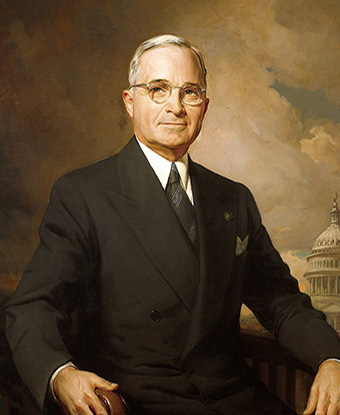Last updated: June 13, 2024
Person
Harry S Truman

President Harry S Truman took America from its traditional isolationism into the age of international involvement. Despite his power, he never forgot where he came from. Today, visitors to Harry S. Truman National Historic Site can experience the surroundings Truman knew as a young man of modest ambition through his political career and final years as a former president.
Born in Lamar, Missouri on May 8, 1884, to John Anderson and Martha Ellen (nee Young) Truman, his family moved to a farm near Grandview in 1887, then, in 1890, to Independence. Harry attended public schools in Independence, graduating from high school in 1901. In 1906 he returned to Grandview to help his father run the farm. He continued working as a farmer for more than ten years.
From 1905 to 1911, Truman served in the Missouri National Guard. When the United States entered World War I, he helped organize the 2nd Regiment of Missouri Field Artillery, which was quickly called into Federal service as the 129th Field Artillery and sent to France. Truman was promoted to Captain and given command of the regiment's Battery D.
On June 28, 1919, Truman married Bess Wallace, whom he had known since childhood. Their only child, Mary Margaret, was born on February 17, 1924. From 1919 to 1922 he ran a men's clothing store in Kansas City with his wartime friend, Eddie Jacobson. The store failed in the postwar recession.
Turning to local politics, Truman was elected in 1922, to be one of three judges of the Jackson County Court. Judge Truman whose duties were in fact administrative rather than judicial, built a reputation for honesty and efficiency in the management of county affairs. He was defeated for reelection in 1924, but won election as presiding judge in the Jackson County Court in 1926. He won reelection in 1930.
In 1934, Truman was elected to the United States Senate. Truman gained national prominence as chairman of the Senate Special Committee to Investigate the National Defense Program. This committee, which came to be called the Truman Committee, sought with considerable success to ensure that defense contractors delivered to the nation quality goods at fair prices.
In July 1944, Truman was nominated to for Vice President with President Franklin D. Roosevelt. On January 20, 1945, he took the vice-presidential oath, and after President Roosevelt's unexpected death only eighty-two days later on April 12, 1945, he was sworn in as the nations' thirty-third President.
As President, Truman oversaw the ending of the war in Europe. He participated in a conference at Potsdam, Germany and worked to lay groundwork for the final stage of the war against Japan. Truman approved the dropping of two atomic bombs on Japan on August 6 and 9, 1945.
Truman's presidency was marked by important foreign policy initiatives. The Truman Doctrine was an enunciation of American willingness to provide military aid to countries resisting communist insurgencies; the Marshall Plan sought to revive the economies of the nations of Europe in the hope that communism would not thrive in the midst of prosperity; the North Atlantic Treaty Organization built a military barrier confronting the Soviet-dominated part of Europe. Truman's recognition of Israel in May 1948 demonstrated his support for democracy and his commitment to a homeland for the Jewish people. The one time during his presidency when a communist nation invaded a non-communist one -- when North Korea invaded South Korea in June 1950 -- Truman responded by waging undeclared war.
The Truman administration went beyond the New Deal in the area of civil rights. Truman was able to use his powers as President to achieve some important changes. He issued executive orders desegregating the armed forces and forbidding racial discrimination in Federal employment. He also established a Committee on Civil Rights and encouraged the Justice Department to argue before the Supreme Court on behalf of plaintiffs fighting against segregation.
In 1948, Truman won reelection. His defeat had been widely expected and often predicted, but Truman's energy in undertaking his campaign and his willingness to confront issues won a plurality of the electorate for him. His famous "Whistlestop" campaign tour through the country has passed into political folklore, as has the photograph of the beaming Truman holding up the newspaper whose headline proclaimed, "Dewey Defeats Truman."
Truman left the presidency and retired to Independence in January 1953. He spent his days reading, writing, lecturing and taking long brisk walks. He took particular satisfaction in founding and supporting his Presidential Library, which made his papers available to scholars, and which opened its doors to everyone who wished to have a glimpse of his remarkable life and career.
Harry S. Truman died on December 26, 1972 at age 88. Bess Truman died on October 18, 1982 at age 97. They are buried side by side in his Presidential Library's courtyard just down the road from his "Summer White House."
